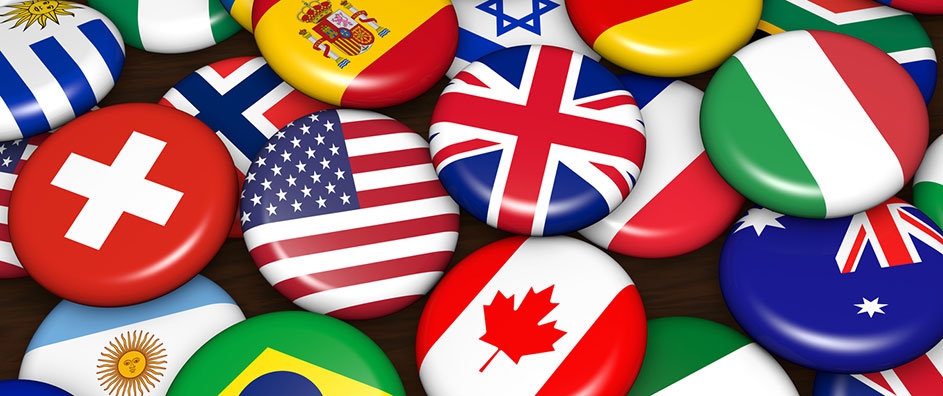The views expressed in our content reflect individual perspectives and do not represent the authoritative views of the Baha'i Faith.
We live at a critical hour in human history, facing a new question: whether to govern ourselves as a collection of nations or as one unified globe.
That historic choice—globalism or nationalism—will define the future.
This vitally important challenge—initially issued by Baha’u’llah in the middle of the 19th century when he called on the world’s political and religious leaders to unite and disarm their nations—has now become the central issue of our time. Do we continue down the old, well-trodden path of nationalism, the planet’s dominant means of political organization for the past 228 years; or do we embark on a new road and go beyond national borders to establish a system of global governance?
The Baha’i teachings strongly advocate in favor of the new road:
Unbridled nationalism, as distinguished from a sane and legitimate patriotism, must give way to a wider loyalty, to the love of humanity as a whole. Baha’u’llah’s statement is: “The earth is but one country, and mankind its citizens.” The concept of world citizenship is a direct result of the contraction of the world into a single neighbourhood through scientific advances and of the indisputable interdependence of nations. Love of all the world’s peoples does not exclude love of one’s country. The advantage of the part in a world society is best served by promoting the advantage of the whole. – The Universal House of Justice, October 1985, The Promise of World Peace, p. 3.
For Baha’is, then, patriotism and love of country aren’t obsolete—they have simply been superseded by the profound recognition of a big, supra-national patriotism, which means developing a wider loyalty, a more all-encompassing embrace of humanity, and a love for the Earth that sustains us all:
Let there be no misgivings as to the animating purpose of the world-wide Law of Baha’u’llah. Far from aiming at the subversion of the existing foundations of society, it seeks to broaden its basis, to remold its institutions in a manner consonant with the needs of an ever-changing world. It can conflict with no legitimate allegiances, nor can it undermine essential loyalties. Its purpose is neither to stifle the flame of a sane and intelligent patriotism in men’s hearts, nor to abolish the system of national autonomy so essential if the evils of excessive centralization are to be avoided. It does not ignore, nor does it attempt to suppress, the diversity of ethnical origins, of climate, of history, of language and tradition, of thought and habit, that differentiate the peoples and nations of the world. It calls for a wider loyalty, for a larger aspiration than any that has animated the human race. It insists upon the subordination of national impulses and interests to the imperative claims of a unified world. It repudiates excessive centralization on one hand, and disclaims all attempts at uniformity on the other. – Shoghi Effendi, The World Order of Baha’u’llah, pp. 41-42.
But how do we get there? How do we build that bigger, more inclusive sense of patriotism, which can encompass everyone everywhere? Without “excessive centralization,” which the Baha’i teachings rule out, how can we establish a system of global governance that protects the rights of each individual citizen, while maintaining world peace and economic stability? How can our governmental structures finally and actually serve the interests of every human being?
When a United States Congressman asked Abdu’l-Baha that question in 1912, he answered that the American model of a federated system of states could provide the world with a valuable blueprint for how to unify:
At so critical an hour in the history of civilization it behooves the leaders of all the nations of the world, great and small, whether in the East or in the West, whether victors or vanquished, to give heed to the clarion call of Baha’u’llah and, thoroughly imbued with a sense of world solidarity, the sine qua non of loyalty to His Cause, arise manfully to carry out in its entirety the one remedial scheme He, the Divine Physician, has prescribed for an ailing humanity. Let them discard, once for all, every preconceived idea, every national prejudice, and give heed to the sublime counsel of Abdu’l-Baha, the authorized Expounder of His teachings. You can best serve your country, was Abdu’l-Baha’s rejoinder to a high official in the service of the federal government of the United States of America, who had questioned Him as to the best manner in which he could promote the interests of his government and people, if you strive, in your capacity as a citizen of the world, to assist in the eventual application of the principle of federalism underlying the government of your own country to the relationships now existing between the peoples and nations of the world. – Shoghi Effendi, The World Order of Baha’u’llah, pp. 36-37.
If you live in the United States, or have ever visited, you know how its federalism works. Each of the fifty American states have autonomous borders, democratically-elected governments and the right to make statewide policy in their citizens’ best interests. But they have no rights to go to war against one another, to maintain individual armies or to contravene national law.
Lots of other national and even regional governments function today as federalist democracies, among them India, Canada, Mexico, Brazil, Australia and now the European Union with its 28 member countries. Many of the world’s most successful nations work this way today. We already have experience, then, in how to implement full federalism on a global stage, since we’ve done it on a national and international level already. We know that it works.
Baha’is believe that this kind of federalism, when applied on a global scale, can lead us on the road to a peaceful, harmonious and prosperous planet.
You May Also Like
Comments

















all the English kingdoms and colonies adorn London.
But your government has a good political order."
Star of the West vol 7 p. 81-82
STAR OF THE WEST v 7
Someone asked regarding the forms of government,
such as the republican, the constitutional, etc.
Abdul Baha answered:
"Europe and other countries will be compelled
to apply the same order that you have. (In America)
In all Europe great changes will take place.
Their states will be independent, ruled by local governments.
Indeed it is not just that a country should be ruled by one central government,
because no matter how just and good the ...members of that center may be,
they are not fully acquainted with the necessary details of other localities and cities,
and they do not strive for an equal progress in all the regions of the country.